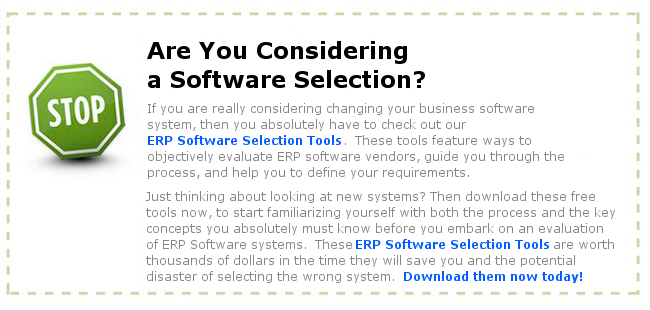Starting an ERP selection and Implementation seems like a huge undertaking. It can be, but it can also be straightforward if you do things properly.

If you are a small to medium sized company, here are some tips to get you going:
1. ERP Vendors – who should you look at? There are many different ERP vendors. The easiest way is to use a free evaluation service such as SoftwareAdvice.com. Their advisors ask you some questions to profile the type of business you are in and then from that they can give you a short list of candidates to focus on. One good article you should examine is to help you understand how ERP vendors are categorized is “ERP – What Tier are you in?” You can also reference our ERP directory for a listing of various ERP vendors.
2. What questions should you be asking the ERP vendors? This is really a questions of how well do you know what you do. Take a look at “How to determine your ERP Evaluation Criteria” to learn more about how you should self examine your company to then have the criteria for evaluating the vendors. You can also get some free templates that will help you in evaluating erp vendors here on our site.
3. ERP Negotiation – How to reach a successful outcome? Negotiation can be stressful, but really it doesn’t have to be. It is a dance that the vendors go through everyday, so they know how to work it and how to make you come to their desired decision point. You can learn more about negotiation through various books, or you can start with this article on ERP Negotiation.
4. ERP Implementation Planning – There are a lot of details to implementing an ERP solution. Here are the Top 20 ERP Implementation tips. Find out also What makes for a successful ERP Implementation. You can also learn about four corners stones to any successful implementations with this article on RICE. Here is a great article on the 12 Steps to a better ERP Launch. Lastly, here is a tongue-in-cheek look at implementations.
We hope these links and articles will help you sort out resources as to where you can start with your ERP project. For more information, please also see our ERP Bookstore where we have a lot of useful books on ERP Selections and Implmentations.

